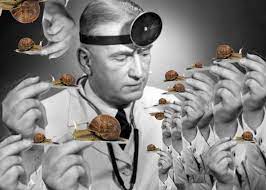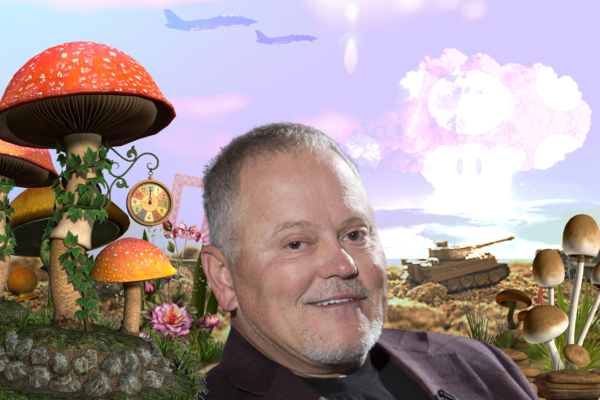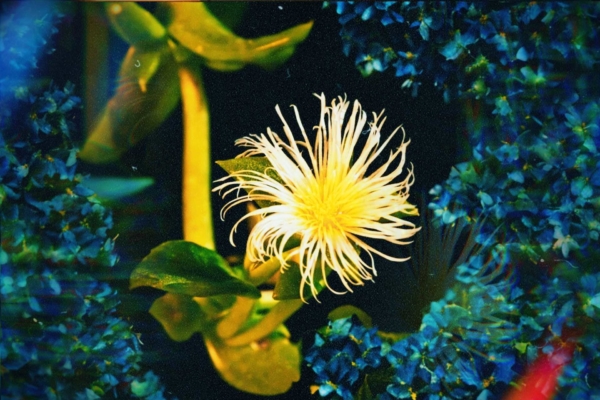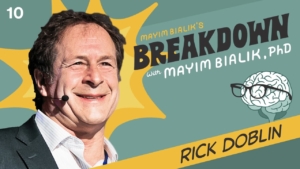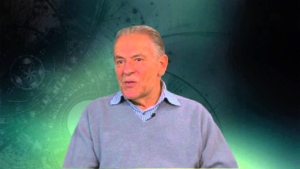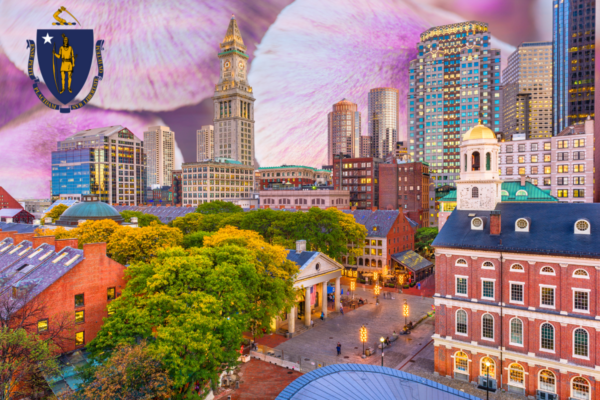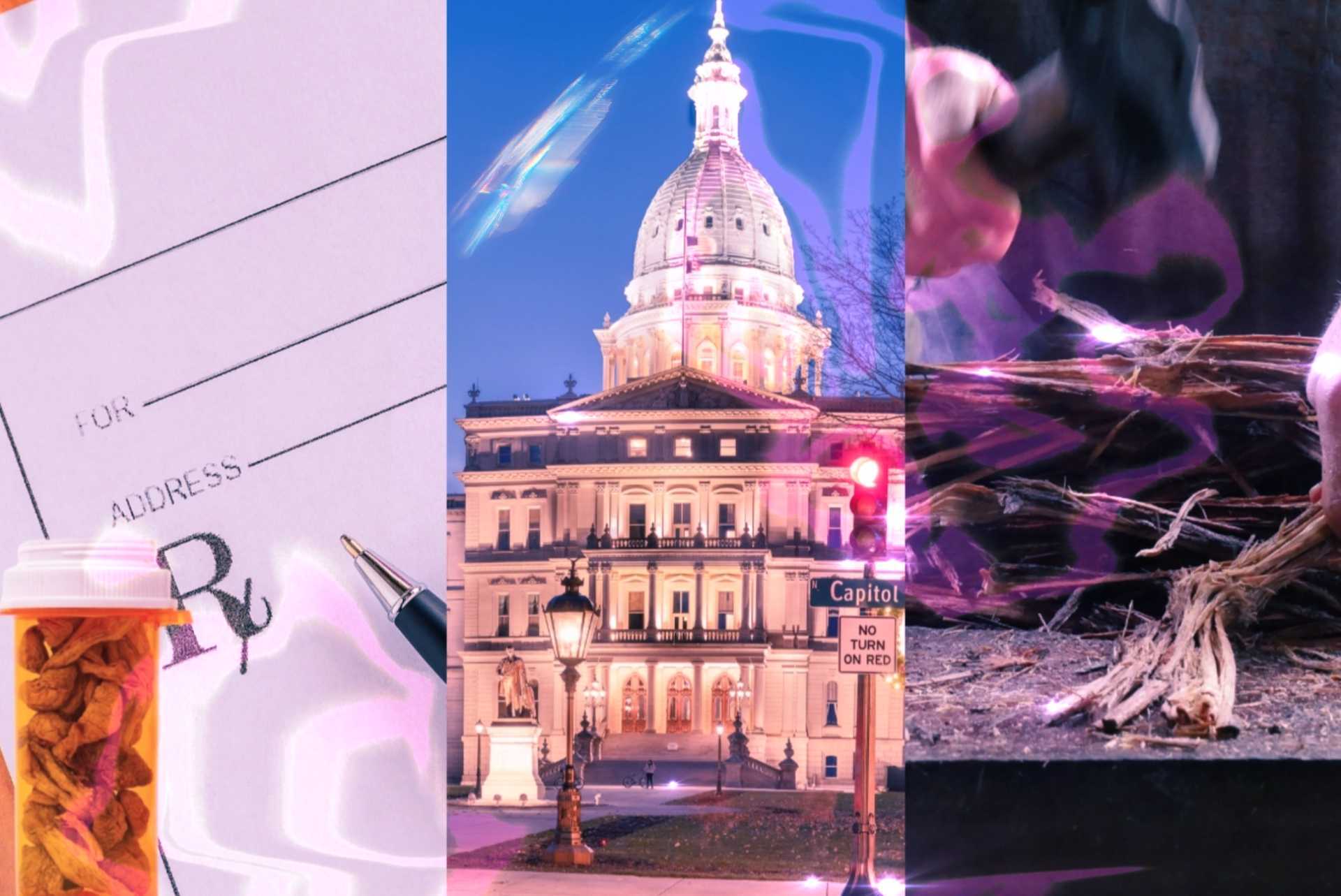
Welcome to another week in the exciting world of psychedelic news. The psychedelic landscape in the US is rapidly changing this year, with a flurry of policies being enacted. We’re also seeing some noteworthy international stories emerge: from ayahuasca raids to a doctor in British Columbia coming under scrutiny for using psychedelics in their treatment regiments.
If you want to keep up with the latest policy developments from this week, check out:
MORE AND MORE PSYCHEDELIC REFORM BILLS IN THE PIPELINE THROUGHOUT UNITED STATES
This week’s biggest psychedelic stories:
We’ll start with Rhode Island, where recent developments have seen lawyers legitimately consider steps towards psilocybin decriminalization.

As of Wednesday, 3/1/2023, two state representatives have put forward an initiative to decriminalize psilocybin. Introduced by state Rep. Brandon Potter (D), and Sen. Meghan Kallman (D), the bill would allow people to possess up to one ounce of psychedelic mushrooms or grow mushrooms containing psilocybin at home for personal use. It would also require the Rhode Island Department of Health to create rules for the use of psychedelic mushrooms, which have yet to be fully stipulated.
This marks the first such legislation in Rhode Island, and would also officially sanction the use of psilocybin for chronic mental health disorders.
According to Rep. Potter, “Veterans and many others in our community are struggling with chronic PTSD, depression, and other mental health disorders that can be totally debilitating. We should give them the freedom to try every tool available and not criminalize a natural, effective remedy.”
Sen. Kallman also added a strong statement after sponsoring the bill, “Psilocybin is not addictive,” Kallman said. “It’s naturally occurring, and people have been using it recreationally and medicinally for thousands of years. It is only illegal because, over 50 years ago, President Nixon associated it with his political opponents. It’s time to undo that mistake and give our neighbors struggling with chronic mental illness, and all Rhode Islanders, the freedom to use psilocybin responsibly.”
Fourth Michigan city mulls decriminalization for psychedelics
After cities such as Detroit, Ann Arbor, and Hazel Park saw similar measures come to fruition, city leadership in Ferndale, Michigan have passed a resolution to decriminalize psychedelic plant medicine. This includes psilocybin, ayahuasca, and DMT.
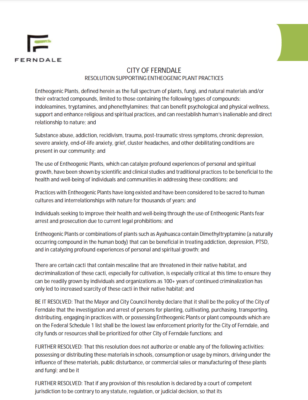
Psychedelics of any kind are still prohibited statewide in Michigan, but the measure makes it the city’s “lowest law enforcement priority” to investigate and arrest people for “planting, cultivating, purchasing, transporting, distributing, engaging in practices with, or possessing” entheogenic plants and fungi.
“City funds or resources shall be prioritized for other City of Ferndale functions,” the measure, sponsored by Mayor Pro Tem Kat Bruner James, states.
The resolution clarifies that the policy shift does not permit the possession or consumption of psychedelics in schools, nor does it allow minors to use the drugs. The city will also continue to enforce bans on commercial sales, driving under the influence and public disturbances, it says.
Billy Horton, of Decriminalize Nature Ferndale, thanked council members for their support on Monday, according to a report by the Detroit Metro Times.
“I just want to continue to emphasize the importance of psychedelic and entheogenic plants and the work that’s going on, the research and the science that’s supporting it for psychological and for physical wellness.”
Religious users of Ayahuasca in Spain have had enough of police raids

A manifesto, authored by The Chacruna Institute, has cultivated over 100 signatures from academics across Europe in order to quell Spanish policing of the substance.
The Chacruna Institute has said that a wave of police raids in Spain are a part of an intentional campaign of “fear, mistrust and misinformation” aimed at calling into question an “ancestral practice that offers numerous benefits for its participants, benefits repeatedly supported by science”, according to a press statement from supporters, Plantaforma para la Defensa de la Ayahuasca (the Platform for the Defense of Ayahuasca).
According to a brief excerpt from the document, “Despite the growing interest in ayahuasca in recent decades, its ritual use dates back to centuries ago. In fact, the first historical records of ayahuasca in the Amazon region date back to the late seventeenth century (Antunes, 2011). Historically, the Amerindian use of ayahuasca, present in Brazil, Peru, Bolivia, Colombia, Venezuela, and Ecuador, had several uses. Ayahuasca has been used to facilitate communication with spiritual realms and to explore relationships with the fauna and the flora of the environment. Shamans often drank it to diagnose and cure illnesses. It was also used for divinatory purposes. Ayahuasca was vital not only in shamanic practices; it was also a significant part of the sociocultural life of several Indigenous Amazonian ethnic groups (Luna, 1986).”
This comes in (seemingly) direct response to a youtuber’s recent hidden camera escapades which depicted Santo Daime (a growing religion originating from Brazil) ceremonies as ‘brainwashing’ and providing illicit drugs without health or safety precautions.
Read: Manifesto calls for end to ayahuasca raids in Spain
BC doctor reprimanded for unauthorized prescribing of psychedelic treatments
The College of Physicians and Surgeons of British Columbia has imposed conditions on Dr. Paul Michael Harris’s practice after the Duncan, B.C., doctor was found in violation of the regulatory body’s professional standards.
According to a Feb. 27 disciplinary notice, Harris admitted to prescribing medication to an employee without documentation and using hypnosis as a non-conventional therapy outside of a medical office setting.
“By repeatedly contravening college practice standards, Dr. Harris placed the employee at risk, and therefore, a disciplinary outcome was appropriate,” the college’s inquiry committee concluded.
As part of a consent resolution agreement between Harris and the regulatory body, Harris’s registration with the college has been downgraded from a “specialty” class to “conditional” class and he has received a formal reprimand.
As part of the conditions placed on his practice, Harris must not provide medical care or prescribe medication to staff or any person close to him, and he must refrain from using non-conventional therapies, specifically hypnosis, outside of a health-care setting.
While the punishments do not seem to stray into serious legal territory, the incident is a stark reminder that, even as psychedelic substances flood mainstream culture and academic research institutions alike, there still lies several years of scientific rigor ahead before ‘off the cuff’ prescription (or even medical recommendation) becomes ubiquitously accepted.
